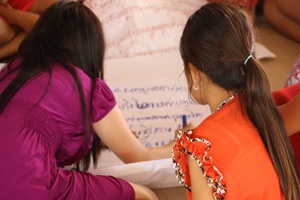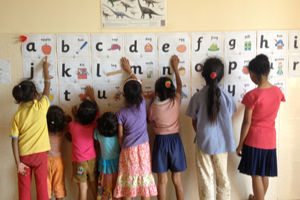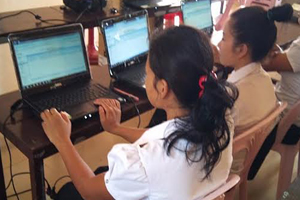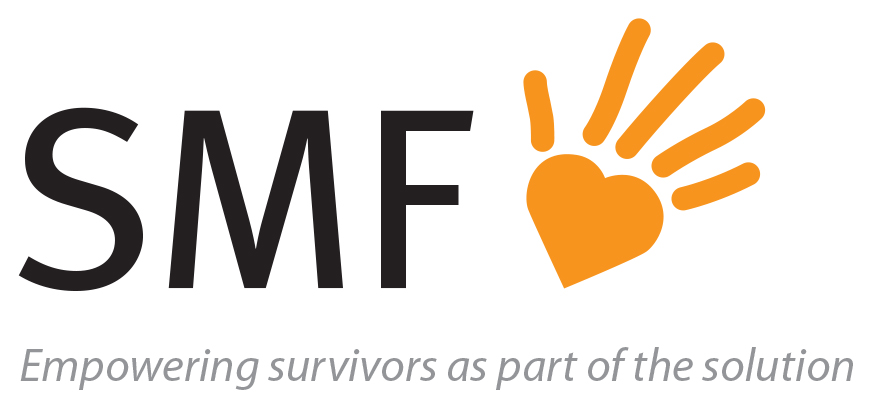 |
 |
 |
Vocational training and education are critical steps to recovery and survivor empowerment.
Victim Services: Rehabilitation
Women and girls who have been affected by sex trafficking and exploitation often suffer severe trauma. Through a holistic approach that focuses on physical, psychological, and social health, we support victims to become empowered survivors, ready to reenter their communities to create lives of independence, freedom, and dignity. SMF does not operate shelters or offer direct services in Cambodia. Instead, we work closely with local partners and experts who carry out this important work on the ground through grants and partnerships.
Since 2007, SMF’s primary beneficiaries have been victim service centers for rehabilitation and recovery that are in the AFESIP network (a French acronym for “Acting for Women in Distressing Situations”), which was founded in 1996. Each year, our grantees receive nearly $1 million in funding from SMF to provide survivors with food, shelter, psychological care, skills training, outreach and peer education, and services through a free medical clinic.
For more than 250 victims of sex trafficking and sexual exploitation, SMF’s key grant partner AFESIP Cambodia’s three centers for recovery and skills training serve as the first step to a new life. Each center aims to meet both the immediate and longer-term needs of every victim who chooses to accept services.
SMF also supports AFESIP Cambodia’s free medical clinic in Phnom Penh’s red light district, which provides women and girls in the sex trade with health care, support, and psychosocial counseling at no cost. AFESIP’s outreach team and SMF’s advocacy team distribute condoms, bars of soap, and educational materials to help protect the women and girls who continue to work in the sex trade from STDs and HIV/AIDS.
Education and vocational training are key indicators for a future free from poverty, future employment, and positive health outcomes. A lack of education and skills often leaves individuals with fewer options — and a less than fruitful job market may make young women or girls vulnerable to future cases of trafficking.
Helping to empower survivors of trafficking and exploitation to pursue an education and vocational skills is one of the first steps toward a life of economic and personal empowerment. Coupled together, these skills can help women to boost their position within their communities, remove stigmas around victims of exploitation, and encourage gender equality. When women reenter their communities as empowered individuals who are capable of earning a living, prejudices will slowly erode. When women become economic drivers and job creators, their influence grows, and their success trickles out to their families and communities. This process of microeconomic development is a strong tool that can be used to chisel away at long-standing gender inequality in Cambodian society.
In addition, since literacy is a basic need for most survivors, SMF funds primary and secondary educational opportunities. This initiative includes English language skills, which provide a distinct advantage in securing a job locally, as well as globally. Life skills workshops on health care, basic human rights, and labor laws are also provided.
Additional training in small-business development and teaching basic entrepreneurial skills is available for survivors aspiring to open their own businesses. Depending on training availability and budget, specific programs geared to income-generating activities or small business development may be offered to the residents.
2013 Impact Highlights
- The AFESIP Cambodia outreach team distributed 648,292 condoms and 10,136 bars of soap to women and girls in the sex trade and their clients to aid in disease prevention and hygiene.
- AFESIP’s free medical clinic in Phnom Penh’s red light district saw 1,220 visitors for healthcare, treatment support, and psychosocial counseling. 28 of those visitors decided to exit prostitution and seek services and training with AFESIP after learning about other options.
- 180 residents of 268 were reintegrated into their communities. All of these cases have received follow-up visits to track progress and ensure success.
- 36 women received start up kits to help them set up their own small businesses. These kits include all of the supplies that a woman might need to get her business off the ground.

